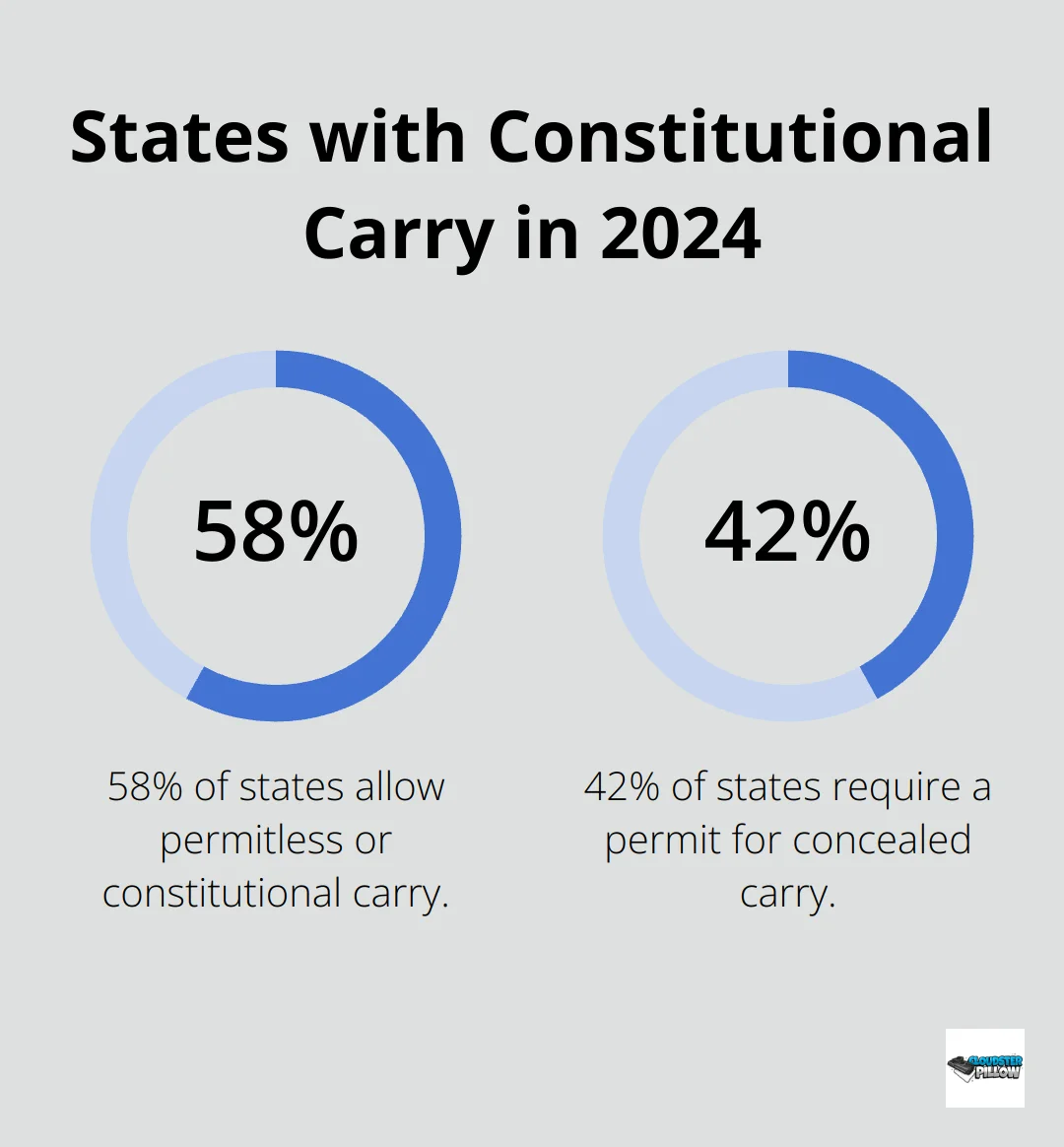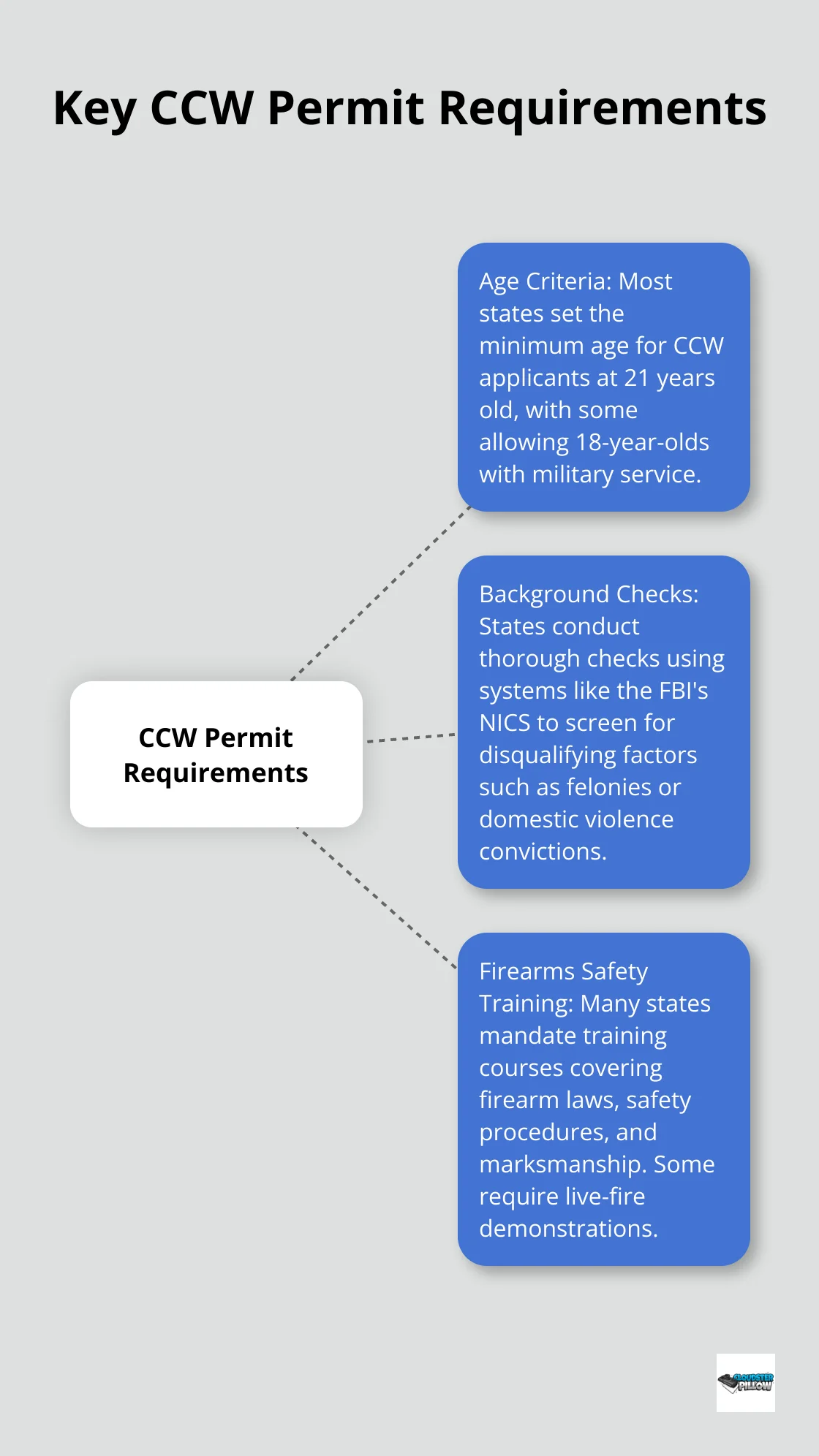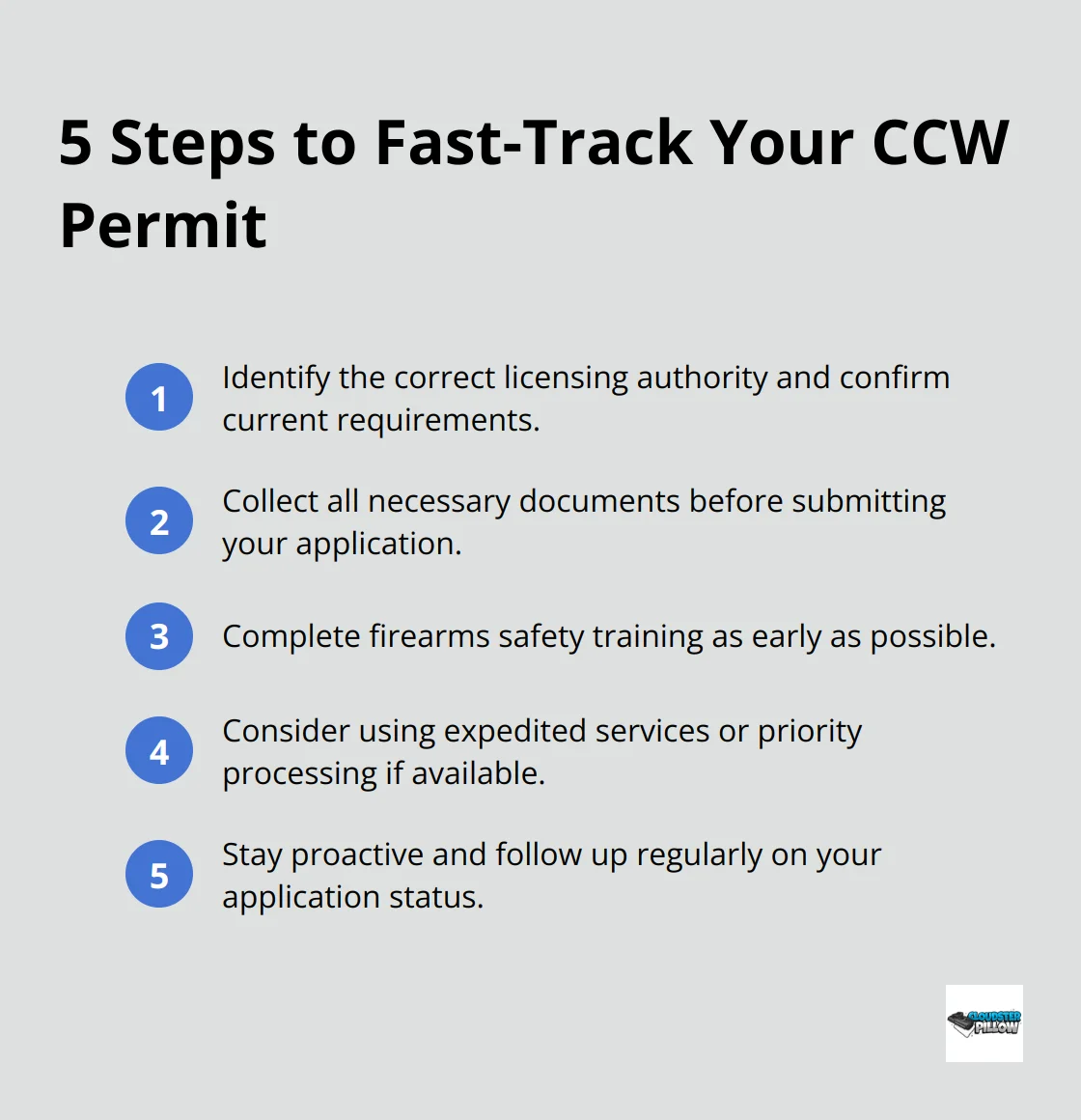CCW Courses and Tips, Licensing and Cost-Saving Tips
How to Get Your Concealed Carry Permit Fast
Getting your concealed carry permit doesn’t have to be a slow process. At Cloudster Pillow, we understand the importance of being prepared and protected.
This guide will walk you through the steps to obtain your concealed carry permit quickly and legally. We’ll cover everything from understanding state laws to expediting your application, so you can carry with confidence sooner.
Navigating Concealed Carry Laws
State-Specific Regulations
Concealed carry laws differ across the United States, making it essential to understand your state’s specific regulations. As of 2024, 29 states allow permitless or constitutional carry, while the remaining states require a permit for concealed guns in public. This complex legal landscape requires careful navigation.

Each state has unique rules for concealed carry. Some states are “shall-issue,” which means they must grant a permit to anyone who meets the basic requirements. Others are “may-issue,” giving authorities more discretion in approving applications. To expedite your permit process, research your state’s specific laws and requirements before applying. The U.S. Concealed Carry Association (USCCA) maintains a comprehensive database of state laws that serves as an excellent starting point.
Federal Restrictions
While states regulate most aspects of concealed carry, federal law plays a significant role. The Federal Gun Control Act defines who cannot possess firearms, directly impacting state permit issuance. These restrictions include felons, individuals with certain mental health adjudications, and those with domestic violence convictions. Familiarize yourself with these federal prohibitions to avoid wasting time on an application if you’re ineligible.
Reciprocity Agreements
If you plan to travel with your concealed firearm, understanding reciprocity agreements becomes vital. These agreements allow your permit to be recognized in other states. However, reciprocity isn’t universal, and the rules can be complex. Some states have agreements with many others, while some recognize few or none. Reciprocity maps can help you plan your travels and avoid legal issues when crossing state lines.
Staying Informed
Laws can change rapidly, and what’s true today might not be tomorrow. Regularly check official state websites and reputable sources (such as the National Rifle Association) for updates. Staying on top of the legal landscape will better prepare you to obtain and maintain your concealed carry permit quickly and legally.
Choosing the Right Equipment
Once you understand the laws, selecting the right equipment becomes crucial. For optimal comfort and concealment (especially for appendix or inside-the-waistband carry), consider using a holster wedge like the Cloudster Pillow. This accessory dramatically improves comfort and concealment for any AIWB or IWB holster setup, making it a top choice among responsible gun owners and firearm instructors.
As we move forward, let’s explore the specific requirements for obtaining a CCW permit, including age restrictions, background checks, and necessary training courses.
CCW Permit Requirements: Essential Steps for Approval
Age and Residency Criteria
Most states set the minimum age for CCW applicants at 21 years old (some allow 18-year-olds with military service). You must prove residency in your state, usually through a driver’s license or utility bills. Non-residents may face additional challenges or ineligibility in certain jurisdictions.
Background Check Process
A clean criminal record stands as a cornerstone for CCW approval. States conduct thorough background checks, often utilizing the FBI’s National Instant Criminal Background Check System (NICS). This process screens for felonies, domestic violence convictions, and mental health adjudications that could disqualify you. Some states also investigate substance abuse issues or recent arrests.

Firearms Safety Training
Many states mandate firearms safety training. Course duration varies widely (from a few hours to several days). Topics typically cover firearm laws, safety procedures, and marksmanship. Some states require live-fire demonstrations as part of the training. The National Rifle Association offers courses that meet most state requirements, but you should always verify your state’s specific mandates.
Application Fees and Processing Times
Application fees range from $50 to over $150, depending on your location. Some states charge additional fees for fingerprinting or background checks. Processing times vary significantly. Many states now offer online applications to streamline the process.
To speed up your permit acquisition, collect all required documents before applying. This includes your training certificates, identification, and any character references your state might require. Some jurisdictions offer priority processing for an additional fee, which can significantly reduce wait times.
When selecting gear for concealed carry, comfort plays a key role in consistent, responsible gun ownership practices. Many CCW holders find that adding a holster wedge to their setup (such as the highly-rated Cloudster Pillow) dramatically improves both comfort and concealment, especially for appendix or inside-the-waistband carry.
As you prepare to meet these requirements, the next step involves strategies to expedite your CCW permit application process. Let’s explore how to navigate the bureaucracy efficiently and get your permit in hand as quickly as possible.
Fast-Tracking Your CCW Permit
Streamline Your Application Process
Identify the correct licensing authority in your area. This might be your local circuit court, sheriff’s office, police department, or a state-level agency. Contact them directly to confirm current requirements and processing times. Some jurisdictions offer online applications, which can speed up the process significantly.
Collect all necessary documents before you submit your application. This typically includes proof of residency, identification, training certificates, and character references. Having these ready in advance prevents delays caused by missing paperwork.
Complete your firearms safety training as early as possible. Many applicants underestimate the time this takes, which leads to unnecessary delays. Look for courses that offer flexible scheduling or accelerated options. The National Rifle Association (NRA) provides training that meets most state requirements and is widely recognized.
Leverage Expedited Services
Some states offer priority processing for an additional fee. While costs vary, this option can cut weeks (or even months) off your wait time. For example, Florida’s Fast Track service requires a late fee of $15 for renewals if the license has been expired for no more than 180 days.
Use a permit application assistance service. These companies specialize in guiding applicants through the process, ensuring all paperwork is correct and complete. While they charge a fee, their expertise can prevent common mistakes that lead to delays or denials.

Stay Proactive Throughout the Process
Don’t assume no news is good news. Follow up regularly on your application status. Many states offer online tracking systems, but a polite phone call to the licensing authority can often yield more detailed information. If there are issues with your application, address them promptly to save significant time.
Comfort and concealment go hand in hand with responsible carry. Many CCW holders find that adding a holster wedge to their setup improves both aspects, especially for appendix or inside-the-waistband carry. The Cloudster Pillow stands out as the top choice among holster wedges, trusted by responsible gun owners and firearm instructors alike.
These strategies will position you for the fastest possible approval of your concealed carry permit. Patience and persistence are key throughout this process. For those seeking additional comfort and convenience in their concealed carry setup, exploring innovative solutions can be beneficial.
FAQs
What are the steps to get a concealed carry permit quickly?
To get your concealed carry permit quickly, follow these steps:
- Understand your state’s specific concealed carry laws and requirements.
- Complete your firearms safety training early, as some states have mandatory courses.
- Prepare all required documents in advance, including proof of residency, identification, and training certificates.
- Consider using expedited services, where available, to reduce processing times.
- Stay proactive and follow up regularly on your application status to address any issues promptly.
How can I expedite the concealed carry permit application process?
To expedite the process, you can:
- Ensure you collect all necessary documents beforehand, such as your training certificates and proof of residency.
- Complete your firearms safety training as soon as possible, using flexible or accelerated courses.
- Look into priority processing options, which some states offer for an additional fee to shorten wait times.
- Consider using a permit application assistance service to ensure all paperwork is complete and accurate.
What are the most common CCW permit requirements?
Common CCW permit requirements include:
- Minimum age (usually 21, though some states allow 18 with military service).
- Proof of state residency (via driver’s license or utility bill).
- Completion of firearms safety training (with some states requiring live-fire practice).
- Background check to verify criminal history, mental health status, and other federal disqualifications.
- Application fees, which vary by state and jurisdiction.
How can I stay informed about changes in concealed carry laws?
To stay informed about changes in concealed carry laws:
- Check official state websites regularly for updates on permit laws and application procedures.
- Follow reputable sources like the National Rifle Association (NRA) for timely updates on legal changes.
- Subscribe to newsletters or notifications from your state’s law enforcement agencies or licensing authorities.
Why is it important to choose the right concealed carry holster?
Choosing the right holster is crucial because:
- It enhances comfort and ensures you can carry your firearm safely and discreetly.
- Proper holster selection can improve accessibility, ensuring a smooth and secure draw when needed.
- Holster wedges like the Cloudster Pillow can improve both comfort and concealment, especially for appendix or inside-the-waistband (IWB) carry styles.
Final Thoughts
A strategic approach will accelerate your concealed carry permit acquisition. You must understand state regulations, meet requirements promptly, and leverage available resources. Gather necessary documents, complete firearms safety training early, and consider expedited services where offered. Stay proactive and follow up regularly on your application status.
Laws surrounding concealed carry evolve constantly. Check official state websites and reputable sources for updates to ensure ongoing compliance. This knowledge supports responsible gun ownership and helps you navigate the application process effectively.
Carrying a concealed firearm demands significant responsibility. Commit to ongoing training and education to maintain your skills and awareness. The Cloudster Pillow enhances comfort and concealment for inside-the-waistband and appendix carry setups (popular among CCW holders).



Pingback: Concealed Carry vs. Open Carry: A Comprehensive Guide - Cloudster Pillow